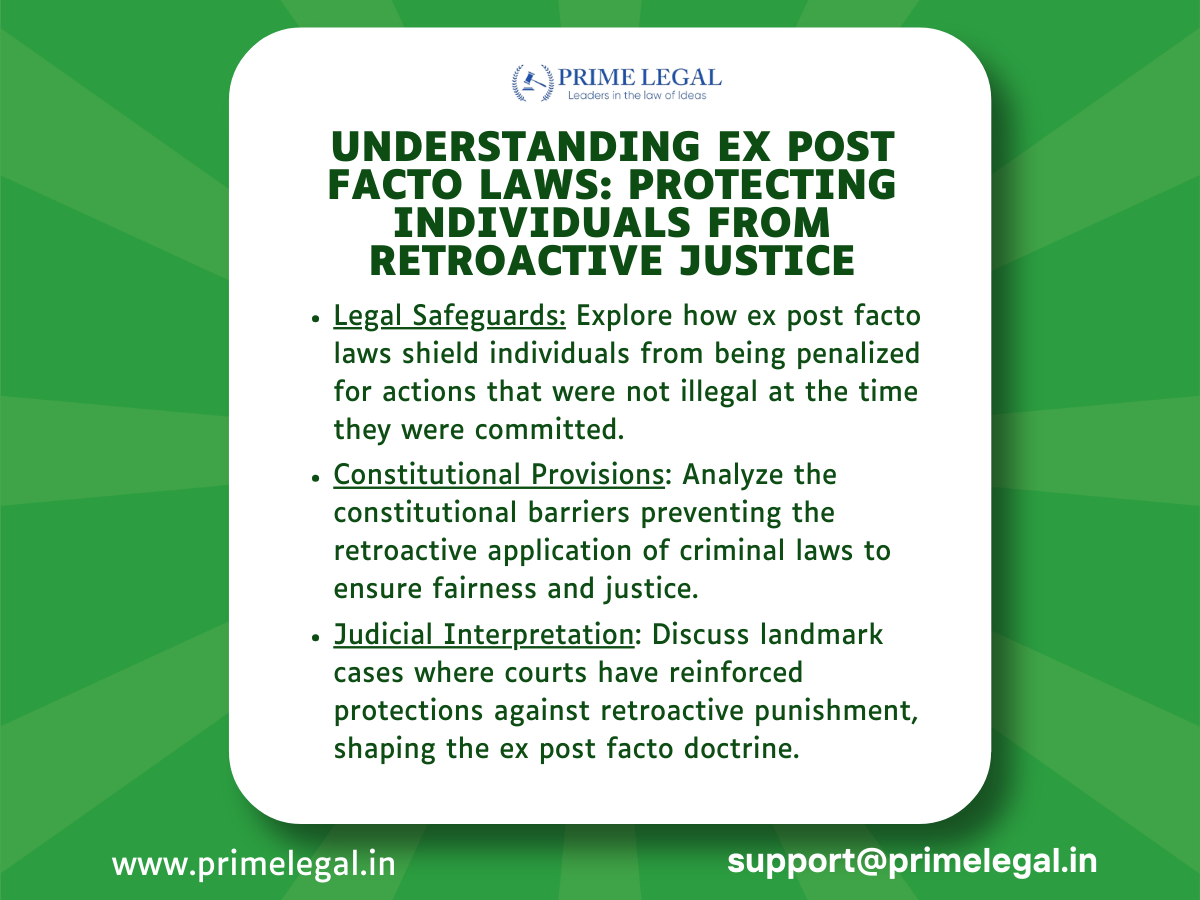ABSTRACT
Ex post facto laws can seem perplexing–but they serve a critical purpose: to ensure the full protection of individual rights. In other words, people cannot be penalized for engaging in conduct that was legal when they did it even if a new law later prohibits the same conduct. This is a central idea of how justice operates in a democratic country (such as India) and guarantees no one can be given suffer punishment retrospectively. We will explain what exactly ex post facto laws are, why they are important and how they preserve justice for all of us.
Key Words : Ex post facto , Retroactive punishment
INTRODUCTION
Imagine this: “Something that you are doing today is completely legal – you eat some particular kind of food, or use some legal gadget. Now, let’s say one year down the line a new law has been passed that says it is unlawful to engage in that activity. Cos if it was okay for you to do it why should you be punished for it? That is why there is the existence of ex post facto laws. Such laws exclude any possibility of someone being punished for any act that was not unlawful at the time the act was being performed.
Ex post facto is actually a Latin termed that can be translated to mean ‘after the fact’ – after laws are passed they are enforced. However, such kinds of laws that put into action the policy of punishment in many countries which are including India are prohibited. It is necessary to understand why it is essential for keeping the legal fairness for us to further discuss that.
THE CONCEPT OF EXPOST FACT TO LAW
Ex post facto laws are those which apply to actions that were committed before the law was passed. In simple words, it means punishing someone for something that was not a crime when they did it. In India, Article 20(1) of the Constitution protects individuals from such laws, which means you cannot be charged with an offense if what you did was not illegal at the time.
This protection is part of what makes justice systems work for the people. Without this protection, the government could change the rules as they like, and people could be punished for something that wasn’t even considered wrong when they did it. This unpredictability would make it impossible for people to live without fear of arbitrary punishments.
WHY ARE EXPOST FACTO LAW A PROBLEM ?
The whole idea of a legal system is to provide a clear understanding of what’s right and wrong so that people can make informed decisions. If laws could change in a way that punishes people for past actions, that certainty would be lost. Imagine a world where the laws change suddenly, and you have no way of knowing if what you did yesterday could get you in trouble today. That would make life super confusing and pretty terrifying, right?
For example, let’s look at the case of KEDAR NATH BAJORIA v. STATE OF WEST BENGAL, where the Supreme Court of India made it clear that laws cannot be used retrospectively to punish someone. This is to ensure that justice remains predictable and not based on sudden legal changes.
HOW THE CONSTITUTION PROTECTS US
In India, the Constitution provides a solid safeguard against ex post facto criminal laws. Article 20(1) explicitly states that no person shall be convicted of any offense except for violating a law that was in force when the action was committed. So, if today’s action is legal, and the law changes tomorrow, you are still protected from being punished for what you did today. This is a fundamental right that aims to protect individuals from unfair legal treatment.
It’s not just India that follows this principle. Most democratic countries, including the United States, have similar protections in their constitutions. This shows how important it is globally to prevent retroactive justice from messing with people’s rights.
EXCEPTIONS AND LIMITATIONS
However, it’s important to note that the protection against ex post facto laws only applies to criminal laws. It means that if a new law increases penalties or creates a new offense, it cannot be applied to acts committed before the law was enacted. But civil laws (like tax laws or administrative rules) may apply retroactively in some cases, though they usually deal with obligations like paying extra fees or taxes, rather than directly punishing individuals.
CONCLUSION
The concept of ex post facto laws is a very interesting feature of our legal system that helps maintain justice and verifiability. For example, without these protections certain people could be at risk from the laws of the government which happen suddenly and no one knows what to do with their authority. Ex post facto protections ensure that is not the case; that no one will be punished for doing something if it was not a crime at time they did.
References
- IPLEADER
2.KEDAR NATH BAJORIA v. STATE OF WEST BENGAL, 1953 AIR 404
“PRIME LEGAL is a full-service law firm that has won a National Award and has more than 20 years of experience in an array of sectors and practice areas. Prime legal falls into the category of best law firm, best lawyer, best family lawyer, best divorce lawyer, best divorce law firm, best criminal lawyer, best criminal law firm, best consumer lawyer, best civil lawyer.”
WRITTEN MY :ABHISHEK AIYAPPA


